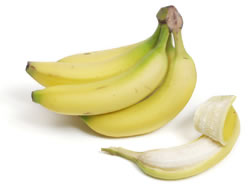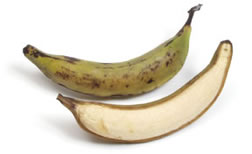| |
|
|
|
|
|
|
|
|
 |
| |
|
| |
A smaller variety of the larger Cavendish cousin, shown at the right. The baby banana is very sweet in flavor and unique in its smaller appearance, generally no more than 3 inches (7.62 centimeters) long. It is a variety that is often used in fruit salads, for baking breads, or as a snack. The baby banana is grown in the tropical countries of South America, the Caribbean, Asia, and Africa. When ripe, the skin will be bright yellow and have a cream-colored flesh. Also known as a Finger, a Ladyfinger, a Lady Finger, or a Nino banana.

|
| |
|
| |
A small plump variety of banana that is commonly used as a dessert or snacking banana. It has bluish-green skin that covers a sweet tasting creamy flesh. This banana is also known as the Blue Java Ice Cream banana. |
| |
|
| |
A flatter, smaller and more rectangular shaped banana, this banana is shorter and chunkier than its cousin, the Cavendish banana. The cream colored flesh provides a distinct lemon flavor when ripe. This banana is used for snacks, in breads, salads, and can be dried for banana chips. |
| |
|
| |
The most common variety of banana used in baking, fruit salads, fruit compotes, and to complement foods. It ranges from approximately 6 to 10 inches (15.24 to
25.40 centimeters)
in length. The outer skin is partially green when sold in food markets and turns yellow when it ripens. When overripe, the skin will turn black and the flesh becomes mushy. Bananas ripen naturally and are at their peak ripeness when the peel is all yellow with a few dark brown specks beginning to appear.

|
| |
|
| |
A smaller member of the banana family , but not as small as the Baby banana, this variety is sweeter, perhaps somewhat drier, and provides a distinctive strawberry or apple flavor. It has a chunkier or thicker appearance than the traditional banana, with an outside skin that has a pale-gold color. This banana is best eaten when the skin begins to show a greater amount of black color or completely blackens. The Manzano banana is grown in South America, Mexico, Caribbean, Asia, and Africa and is also known as the Apple banana. |
| |
|
| |
A large "cooking banana" that is flatter and longer than the common Cavendish banana. With a firm texture and a mild flavor, similar to a squash, the flesh of this banana contains less sugar but more starch than other varieties. Consequently, it is often served as a vegetable or potato and made into savory dishes. The plantain is frequently used in Mexican and Caribbean cooking and is generally fried, braised, mashed, sautéed, or stewed. The thick skin of the plantain ranges in color from green prior to ripening to yellow and then brownish-black as it fully ripens. Its flesh is light pink or light salmon in color and darkens as it ripens. As it ripens the starch turns to sugar, making it sweet enough to use in desserts.

|
| |
|
| |
A variety of banana, with a reddish-purple skin, that is shorter and plumper than the traditional Cavendish banana. Raw red bananas have a flesh that is cream to light pink in color and are sweeter than the yellow Cavendish varieties. The red banana is at its peak ripeness when some black spots have begun to appear on the reddish-purple skin. When ripe, their texture is somewhat soft, making them less of a good quality eating banana. Grown in South America and Asia, this fruit can be used in salads or fruit compotes, but is most often used as a baking banana. Red bananas are also known as Jamaican bananas.

Source: http://www.hormel.com/templates/template.asp?catitemid=113&id=832
|
| |
| |
|
| |
|
| |
| |
| |
| |
|
|
| |
 |
 |
 |
| Names |
| |
|
|
|
Musa sp. |
|
|
Vernacular: |
|
English: |
Banana |
French: |
Bananier nain
|
Indonesia: |
Pisang |
Malaysia: |
Pisang |
Philippines: |
Saging
|
Thai: |
Kluai |
Vietnam: |
Choui |
| Costa Rica: |
Banano enano |
| Colombia: |
Cambur, Camburi |
| Brazil: |
Banana maca |
| Sudan: |
Baranda |
|
|
Scientific classification: |
|
|
Kingdom: |
Plantae |
Division: |
Magnoliophyta |
Class: |
Liliopsida |
Order: |
Zingiberales |
Family: |
Musaceae |
Genus: |
Musa |
|
|
|
 |
 |
 |
|
| |
Source: http://en.wikipedia.org/wiki/Banana |
| |
|

